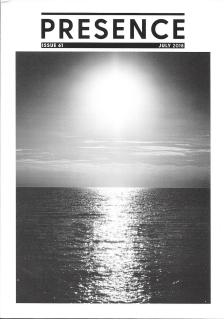
This month I’m featuring one of my fellow haiku poets: Ian Storr. He is a history graduate and trained social worker whose last job before he retired was with Voice for the Child in Care, managing their advocacy service in the north of England. Ian has been writing haiku and tanka since the mid-1970s and he has had over 200 published in British and oversees journals.
His poems have won prizes in Britain, Canada and Ireland and they have been included in British and international anthologies. Ian is the production and poetry editor of Presence magazine, described by the Founder and Chairperson of The Haiku Foundation as “the most important haiku journal in English outside the United States.”
I first met Ian more than 25 years ago and I’m delighted to share a selection of his writing with you. His tanka, in particular, I find deeply moving and masterful examples.
Haiku
Brightening
the house in winter
orange roses from the wreath
Cleft of the brook
wood sorrel bright
on a fallen birch
wind strengthening a skylark holds his place of song
The rhythm of
this baby’s sleep upon me
. . . days of rain
Valley head
white with cotton grass
the silence before the raven
Sweeping rain
deer on the ridge
climb into cloud
Gusts from the street
the store greeter’s
unreturned hellos
Darkening marsh
the swirl of golden plovers
settles again
Tanka
Night mist . . .
back where I was born
I walk this lane again
down to the flooded pit shaft
where tinkers used to camp
Snow falls tonight
as I drive slowly home
against the windscreen
a drift of stars
melting into water
Our son of seven weeks
struggles from sleep in my arms
tight in his hand
from the night’s feed
a long strand of your hair
Our balcony
over the settled sea . . .
you bring on two white plates
grapes the green of jade
the seeds within like shadows
More an ache than sorrow
this second anniversary . . .
falling on shrouded hills
and reservoir
the wet november snow
I put on my father’s boots
for a path I’ve never walked . . .
through reeds and cotton grass
comes the autumn wind
sounding like the sea
Year ending
frost covers the boards
of the empty pier
above a beach
strewn with razor shells
A stretcher-bearer
wounded twice and twice
returned to the front
Grandpa back on duckboards
over the sucking mud






